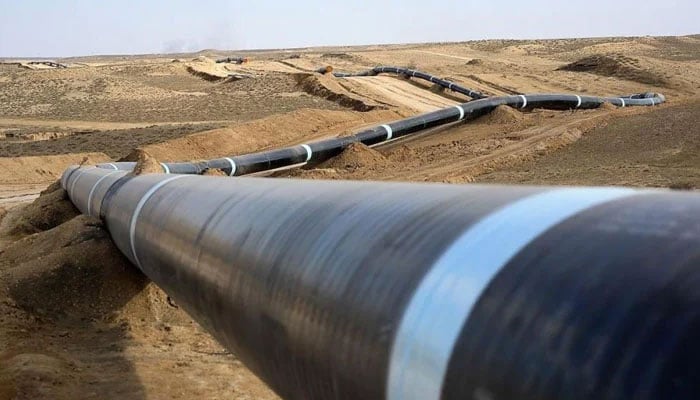FIPPA law to shield Turkmenistan investment in $10 billion TAPI project
ISLAMABAD: The government has decided to extend the Foreign Investment Promotion and Protection Act (FIPPA), a special legislative cover, to the investment of Turkmenistan in the TAPI gas pipeline project, a senior energy ministry official said on Tuesday.
The move is aimed at increasing the bankability of the project in the eyes of the international lenders, which is estimated to cost $10 billion and will transport natural gas from Turkmenistan to Pakistan through Afghanistan and India.
Turkmenistan will have an 85 percent stake in the project, while Afghanistan, Pakistan and India will each have a 5 percent share.
The FIPPA law, which was previously passed to exclusively protect foreign investment in the Reko Diq copper and gold mine in Baluchistan, will provide guarantees to the Turkmen investment in the TAPI project, the official told The News.
"The law division has no objection to extending the FIPPA cover to the TAPI project." Pakistan has already assured the protection of Turkmen investment with a sovereign guarantee under the Host Government Agreement (HGA), which was signed in 2016 along with the Gas Pipeline Framework Agreement (GPFA).
The commercial and legal experts have been engaged to evaluate the alignment of existing commitments under the GPFA and HGA with the incentives package under FIPPA, and the process will be concluded by December 31, 2023.
"The SIFC (Special Investment Facilitation Council) Apex Committee will approve the recommendations in its next meeting for the final approval by the federal cabinet," the official said.
Turkmenistan’s demand was earlier raised by the petroleum authorities in the high-level meeting of SIFC, which decided to seek inputs from all the stakeholders and formulate recommendations for the apex committee of SIFC.
The petroleum division had also sought the opinion of the law division on giving the protection under FIPPA cover. Pakistan has already assured the protection of Turkmen investment with a sovereign guarantee under the Host Government Agreement (HGA). However, the FIPPA, 2022, would serve as a one-window for incentives and guarantees to the Turkmen investment in the project.
The gas pipeline project would be built and commissioned at a 30:70 percent equity and loan business plan. Out of 30 percent equity, Turkmenistan has an 85 percent share, and Afghanistan, Pakistan, and India each have a five percent share. Pakistan’s equity stands at $200 million.
The remaining 70 percent of the funding would be based on loans that the TAPI consortium will arrange from international financial institutions.
The project has been delayed for about seven years, mainly because of the failure in financial closures and, in the latest scenario, since the Taliban took power in Afghanistan, the Asian Development Bank (ADB) halted due diligence and processing activities for the TAPI project until the Taliban regime is legitimized by the United Nations and the big economies of the world.
However, Turkmenistan and Pakistan, on June 9, 2023, signed a Joint Implementation Plan (JIP) to accelerate work on the TAPI Gas Pipeline project in Islamabad. Pakistan has suggested to Turkmenistan to lay down some portion of the gas line up to Herat in Afghanistan to ensure the ownership from the Taliban, which will also help move the project forward.
The TAPI gas pipeline project aims to bring natural gas from the Galkynysh gas field in Turkmenistan to Pakistan through Afghanistan via a 56-inch diameter pipeline. The Galkynysh gas field is located in the eastern region of Turkmenistan.
The proposed route of the supply source is Herat, Kandahar, Chaman, Zhob, DG Khan, Multan, and Fazilika, with a pipeline length of 1,849 kilometers. It will transport up to 33 billion cubic meters (bcm) (average 3.2 BCFD) of natural gas per year over a 30-year period, where Pakistan’s off-take will be 1.35 BCFD.
-
 Eric Dane’s Friends Initiate GoFundMe To 'support' His Two Daughters After His Death At 53
Eric Dane’s Friends Initiate GoFundMe To 'support' His Two Daughters After His Death At 53 -
 Internet Erupts After Candace Owens Claims Elon Musk And Sam Altman Are ‘not Human’
Internet Erupts After Candace Owens Claims Elon Musk And Sam Altman Are ‘not Human’ -
 Will Princess Beatrice, Eugenie Stay In Contact With Andrew? Source Speaks Out
Will Princess Beatrice, Eugenie Stay In Contact With Andrew? Source Speaks Out -
 ‘AI Revolution Is Coming Fast & US Has No Clue,’ Bernie Sanders Warns Of Speed Of Disruption
‘AI Revolution Is Coming Fast & US Has No Clue,’ Bernie Sanders Warns Of Speed Of Disruption -
 Hong Kong Touts Stability,unique Trade Advantages As Trump’s Global Tariff Sparks Market Volatility
Hong Kong Touts Stability,unique Trade Advantages As Trump’s Global Tariff Sparks Market Volatility -
 ‘Miracle On Ice’ Redux? US Men Chase First Olympic Hockey Gold In 46 Years Against Canada
‘Miracle On Ice’ Redux? US Men Chase First Olympic Hockey Gold In 46 Years Against Canada -
 Friedrich Merz Heads To China For High Stakes Talks In An Effort To Reset Strained Trade Relations
Friedrich Merz Heads To China For High Stakes Talks In An Effort To Reset Strained Trade Relations -
 Astronauts Face Life Threatening Risk On Boeing Starliner, NASA Says
Astronauts Face Life Threatening Risk On Boeing Starliner, NASA Says -
 Hailey Bieber Reveals How Having Ovarian Cysts Is 'never Fun'
Hailey Bieber Reveals How Having Ovarian Cysts Is 'never Fun' -
 Kayla Nicole Looks Back On Travis Kelce Split, Calls It ‘right Person, Wrong Time’
Kayla Nicole Looks Back On Travis Kelce Split, Calls It ‘right Person, Wrong Time’ -
 Prince William And Kate Middleton Extend Support Message After Curling Team Reaches Olympic Gold Final
Prince William And Kate Middleton Extend Support Message After Curling Team Reaches Olympic Gold Final -
 Nvidia CEO Praises Elon Musk, Calls Him An ‘extraordinary Engineer'
Nvidia CEO Praises Elon Musk, Calls Him An ‘extraordinary Engineer' -
 Shia LaBeouf's Mugshot Released After Mardi Gras Arrest On Battery Allegations In New Orleans
Shia LaBeouf's Mugshot Released After Mardi Gras Arrest On Battery Allegations In New Orleans -
 Timothee Chalamet Felt '17 Again' After Reunion With 'Interstellar' Director Christopher Nolan
Timothee Chalamet Felt '17 Again' After Reunion With 'Interstellar' Director Christopher Nolan -
 Conan O'Brien Speaks First Time After Rob Reiner's Killing
Conan O'Brien Speaks First Time After Rob Reiner's Killing -
 Giant Tortoise Reintroduced To Island After Almost 200 Years
Giant Tortoise Reintroduced To Island After Almost 200 Years




